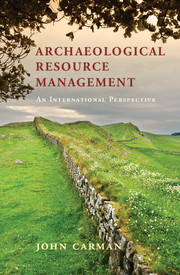
- Publisher:
- Cambridge University Press
- Online publication date:
- September 2015
- Print publication year:
- 2015
- Online ISBN:
- 9781139020473
Our systems are now restored following recent technical disruption, and we’re working hard to catch up on publishing. We apologise for the inconvenience caused. Find out more: https://www.cambridge.org/universitypress/about-us/news-and-blogs/cambridge-university-press-publishing-update-following-technical-disruption

Archaeological resource management (ARM) is the practice of recording, evaluating, preserving for future research and presenting to the public the material remains of the past. Almost all countries uphold a set of principles and laws for the preservation and professional management of archaeological remains. This book offers a critical and comparative perspective on the law and professional practices of managing archaeological remains. Beginning with a global history of ARM, John Carman provides an overview of legal and professional regulations governing ARM today. He then turns to consider the main practices involved in managing archaeological remains, namely, their identification and recording, their evaluation for 'significance', their preservation and their presentation to the public. As a whole, the book offers an overview of what ARM 'does' in the world, with implications for understanding the role of archaeology as a contemporary set of practices that determine how future generations will access material remains of the past.
‘Archaeological Resource Management is the big success story of recent decades, relevant in every corner of the globe from America to Zanzibar. This first-rate volume explores current theory and practice in an accessible way with refreshingly clear insights into the history, structure and working of modern archaeology.’
Timothy Darvill - Bournemouth University
‘John Carman skilfully guides us through a panorama of archaeological resource management, and when we reach its exit, we will have gained a clearer grasp of and objectives for our everyday archaeological practice, that has to be more concerned with its social, cultural, economic, political and regal implications than ever before. A must-read not only for archaeological resource management specialists but also for anyone who is interested in the implications of archaeology as a social practice.’
Koji Mizoguchi - Kyushu University
‘This is a most useful and comprehensive overview of what constitutes the field of archaeological heritage in its totality, and as such it is unparalleled. As most archaeologists today are being employed within the heritage field, a book of this kind will appeal to a wide audience.’
Kristian Kristiansen - University of Gothenburg
 Loading metrics...
Loading metrics...
* Views captured on Cambridge Core between #date#. This data will be updated every 24 hours.
Usage data cannot currently be displayed.